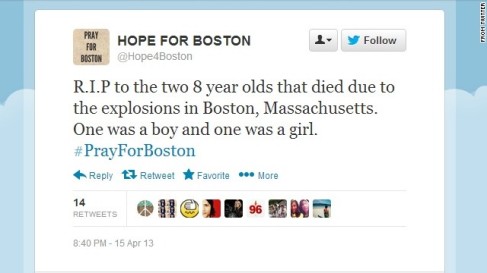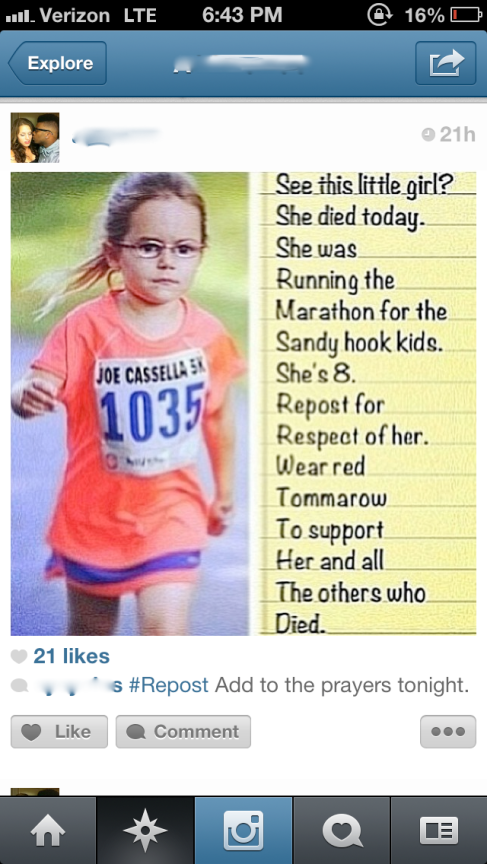In the wake of the Boston tragedy, Twitter, Facebook, Instagram, and other major social media sites were putting out information faster than many accredited news sources. People were sad, angry, confused, and worried. Both individuals and organizations were sending out information from Boston and all over the world to try to give people accurate information and connect people with friends and families. While these social media sites are often useful in providing valuable information in the midst of chaos and poor cell service, much of the information is often unreliable. The pressure to provide information immediately allows for sloppy journalism and false information on social media sites.
One of the first myths I saw was on Instagram. A screenshot of the post is below, and it shows a little girl running the marathon. The post claimed that she was running in honor of Sandy Hook elementary school, and died as a result of the explosions.
The claim is 100% false. After seeing a few of these posts, both on Instagram and Facebook, I checked more credible news sources, and saw nothing indicating any young girl had died. Since then, CNN tweeted and posted an article on their homepage about the various myths that were spread.
The article disproves the 5 major myths that were spread, and also has a photo from the Twitter account @Hope4Boston (photo below). 
CNN writes “Sometimes accidentally and sometimes maliciously, false information gets loose. And in the rapid-fire digital echo chamber, it doesn’t take long to spread”. CNN goes on to dispel the 5 major false rumors that were spread. The myths are listed below.
- Man planned to propose, girlfriend killed
- Young girl died at finish line (same story as photo above)
- Race organizers will donate for retweets
- Authorities shut down cell phone service
- Conspiracy theories
I was glad to see CNN posted this article, since the above 5 stories had been circulating on social media and had been mentioned in my own friend group. Unfortunately, it wasn’t just Twitter and other social media sites publishing false information.
Most significantly, the New York Post originally published that 12 people died in the explosions, which is also simply not true. Vanity Fair posted a satirical article outlining the few things that the New York Post actually got right — that the marathon was in Boston, and that they spelled Boston right. The inaccurate and misleading article was online for hours, and is now receiving much criticism for its false reporting. A screenshot of my close friend’s Tweet is below.
Of course, there were benefits to the use of social media yesterday. Cell service was spotty – so many relied on Wifi and websites to get information. There were several lists and documents to help people find their families and in helping people communicate. For example, various individuals tweeted about where people could gain access to Wifi. However, the examples and photos above demonstrate the many pitfalls and shortcomings of social media during and after the Boston Marathon, and highlight a major flaw in journalism and the deterioration of availability of accurate and reliable information.



April 16th, 2013 at 7:36 pm
I began following Twitter feed around an hour before this photo broke. It was the first time I followed Twitter feed on an incident of any kind; mostly because I’m busy doing other things. When that photo showed up every gut impulse in me said “No, this is too soon; how can anyone know this to be factual?” Also, I could not determine it was from a reputable news source, so I remained skeptical. Sadly, my suspicion was borne out when it was revealed an 8 year old boy was the fatality. Early in my career I was a trained journalist, so I suppose those instincts kicked in. It concerns me that our “instant info age” has allowed people to play citizen journalist without solid credentials. It’s very much like the “fog of war.” Everyone needs to hold their peace (and Tweets, fingers on keyboards, etc.) until facts emerge.
April 16th, 2013 at 9:23 pm
I could not agree more with the comment above and would like to add my own criticism to such irresponsible journalism. One, I fail to grasp the reasons as to why anyone would feel the need to fabricate false stories in such a tragedy. It is disrespectful to the loved ones of all those who were actually killed or severely injured in the incident. Two, even if one was trying to prove the gullibility of social media users or promote the dangers to such fast access to information, no one will be able to get over the context of such a lie to reflect on these ideas.
April 17th, 2013 at 9:19 am
Nice post Sarah!… great title 😉
On a similar note– a tweet posted by CNN came up on my Twitter feed this morning and read “Beware bogus Boston Marathon charity websites:
money.cnn.com/2013/04/17/pf/boston-marathon-charity”
It is very cool that even though social media may have been the source of some of the rumors about the Boston Marathon, it can also be used to correct myths as well.
April 17th, 2013 at 12:52 pm
Favorite post! Is it completely terrible that I didn’t know this was untrue until you mentioned it in class? It just goes to show how gullible the American population (including me) is and how social media lacks credibility. It’s also terrible and extremely bizarre that people would make stories like this up after an incident like that.
April 18th, 2013 at 3:49 pm
Really interesting post. I’ve never followed a major news story on twitter before and definitely have some mixed opinions on the experience. Being a Bostonian, I was incredibly anxious all day and really appreciated the instantaneous updates. There was a period where the Boston Globe updated every 45 seconds. However, some of the rumors caused me unnecessary stress that I didn’t appreciate. Overall, I’m happy that I had access to twitter on Monday but I wish there was a bit more attention payed to fact checking.